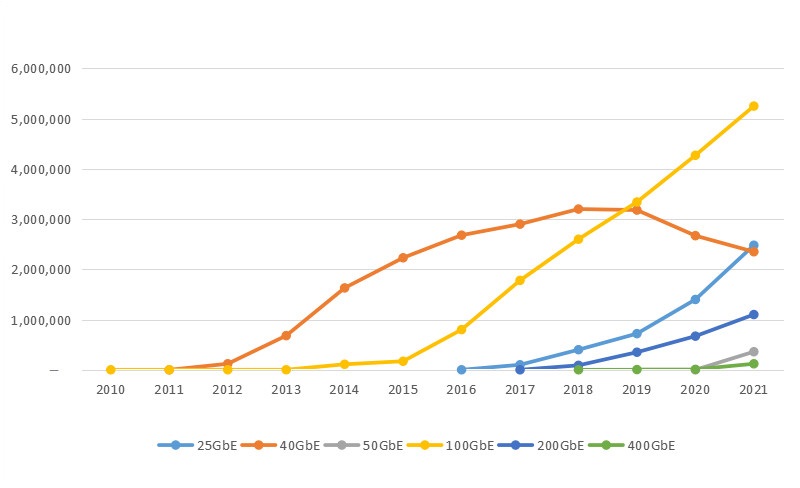25G Transceiver Market Pushed by 5G Front-Haul Network
The advent of the 5G era fuels the need for higher bandwidth and ultra-low latency network. The 25G module market will skyrocket to satisfy the higher base-station density due to that the network granularity is 25Gbps in 5G front-haul network. This article will provide some insights into the 25G transceiver market in the 5G era.
5G Front-Haul Drives the Outbreak of 25G Transceiver Market
Considering the convenience and efficiency of network construction, the initial 5G front-haul connection will be based on the fiber direct connection, supplemented by the passive WDM connection and the active WDM/OTN/ SPN connection.

Figure 1: 5G Front-Haul Network Architecture
Point-to-point direct connection is used to link each AAU (Active Antenna Unit) and the DU (Distribute Unit). Since it takes a lot of fiber resources, the connection needs necessary strategies to save fiber cables, such as using 25G BiDi optical modules and 25G WDM modules.
25G BiDi optical module adopts WDM technology to multiplex multiple wavelengths into one single fiber, supporting transmission distances of 300m and 10km. In the passive 25G WDM network, the 25G WDM module is installed on the AAU and DU, while the active WDM/OTN devices are configured in the AAU site and the DU equipment room. They utilize WDM technology, providing multiple AAU to DU connections by using a pair of optical fiber. These two are efficient supplements to the fiber-to-fiber direct connection in front-haul 5G deployment to solve the fiber exhaust. Therefore, a great amount of various 25G optical transceivers will be applied in 5G front-haul transmission, which lays a solid foundation of a promising 25G transceiver market.
25G Transceiver Market Analysis and Forecast
In this section, the current implementation scenarios of 25G transceivers in 5G front-haul transmission, and how the market will progress under such a circumstance will be discussed below.
25G Transceiver Development Pushed by Higher Data Rates Requirement
In the age of 4G, single-mode 10G SFP+ optical transceivers are the dominance of front-haul network. However, the number of 5G base stations is expected to be 1.3-1.5 times larger than that of 4G. It is predicted that the number of 5G macro base stations will exceed 5 million, which demands for higher speed optical transceivers. Since the network granularity of 5G front-haul transmission is 25Gbps, the needs for 25G optical transceivers will be stimulated because of the increasing number of 5G base stations.
25G Transceiver Market Boosted by Technology Development
25G Ethernet technology is developed with the merits of low-cost, low-power consumption and high density. As the use of the 25G transceiver in 5G network keeps burgeoning, more and more optical transceiver manufactures will intensively participate in the research and development of 25G transceivers technology around 5G application. For instance, WDM technology adopted by 25G BiDi modules and 25G WDM modules is used to save fiber resources in 5G front-haul transmission.
25G Transceiver Market Promoted by Competition
In addition, the fierce competition will significantly drive the 25G optics market growth. By 2021, the carriers will work to get infrastructures and systems ready to transition to 5G, and the 25G optical module market is anticipated to reach a 2-million. Moreover, 25G optical module also serves as the building block of migration to 100G or 400G Ethernet, which further stimulates the market to prosper. It means that 25G is offering a promising future of development with its trial functioning and full-blown deployments in 2020.

Figure 2: 25G/40G/50G/100G/200G/400G Optical Transceivers Market Forecast
Conclusion
As the starting point of the 100G/400G network, the 25G transceiver market will be more competitive and lead to a new peak in the following years. Due to the increased 5G base stations, mature 25G transceiver solutions and decreasing cost of 25G modules, the 25G transceiver will become mainstream in the near future.
You might be interested in
Email Address

-
PoE vs PoE+ vs PoE++ Switch: How to Choose?
May 30, 2024













